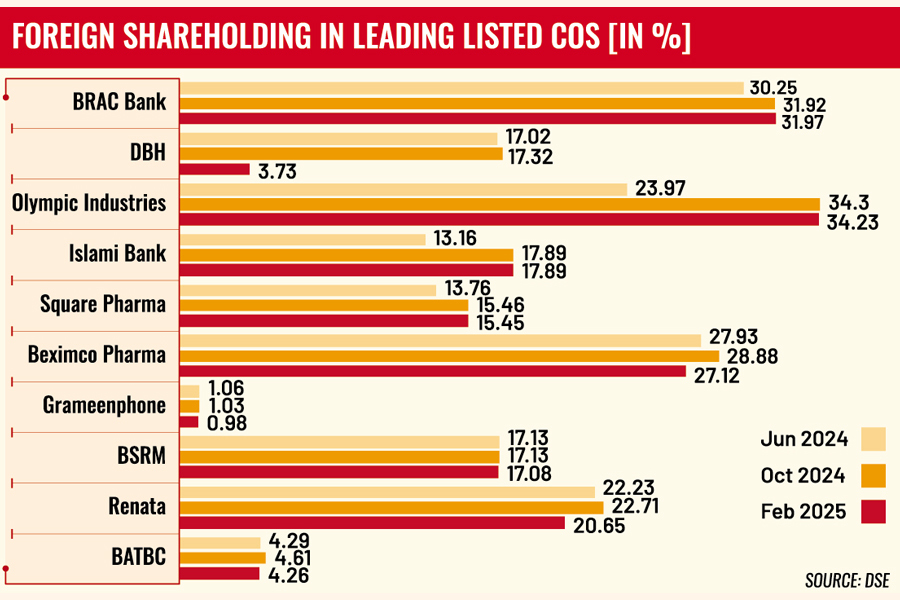Foreign investors exit equity market as fresh concerns replace optimism

Published :
Updated :

Foreign investors have retreated from Bangladesh's equity market once again over persistent economic challenges and political uncertainties after signs of a return following political changeover in August last year.
Economic reform measures taken by the interim government gave rise to optimism about a turnaround of the market, which was why foreign stakes in well-performing companies jumped in October last year compared to what was in June the same year.
But the hope has gradually petered out as macroeconomic challenges deepened alongside intensifying political tension in the country. The high value of the dollar against the local currency has remained another major concern.
Subsequently, the index of the Dhaka Stock Exchange (DSE) plunged 15 per cent from its peak in August last year through Sunday while it lost Tk 680 billion in assets' value during the same period.
"Political and macroeconomic instability discouraged overseas investors from making fresh investments in stocks," said a leading broker, who deals with foreign portfolios, requesting not to be named.
Other factors, he said, include confidence crisis, low number of investable securities, and a lack of good governance.
In November 2024, foreign investors bought shares worth Tk 1.65 billion but sold assets equivalent to Tk 2 billion, resulting in a negative net investment of Tk 350 million. The erosion of foreign stakes continued in December, with share purchases of Tk 730 million against selloffs of Tk 960 million. Foreign investors withdrew their funds in January and February this year as well.
Owing to a lower participation of foreign investors, overall foreign transactions slumped 36 per cent year-on-year to Tk 6.18 billion in the first quarter through March this year.
Akramul Alam, head of research at Royal Capital, put more emphasis on the stronger dollar as a deciding factor against investments.
"When the local currency gets cheaper, foreign investors incur losses as the value of their assets falls even when share prices have remained unchanged," he said.
So, foreign investors sold their shares when they forecasted that the currency would be devalued further, said Mr Alam.
In the four months to February, they withdrew funds from major stocks.
Although the foreign exchange market has stabilised in recent months due to higher dollar inflows, driven by higher remittances and stronger export earnings, the taka-dollar exchange rates remain as high as before.
Currently, banks officially quote Tk 122 per dollar, but the actual rates that they charge importers hover around Tk 125, according to bank officials. The 35 per cent devaluation of the taka against the US dollar since the outbreak of the Russia-Ukraine war dealt a heavy blow to foreign investors.
Hence, foreign shareholding in DBH Finance plunged from 17.02 per cent to 3.73 per cent between October 2024 and February this year. Grameenphone, the largest stock in consideration of market capitalisation, experienced a similar trend. Its foreign stake was reduced to 0.98 per cent in February from 1.0.3 per cent in October last year. Foreign stakes in BAT Bangladesh too fell from 4.30 per cent to 4.26 per cent between October 2024 and February this year.
When it comes to investing in stocks in Bangladesh, foreigners are mostly interested in multinational companies. The companies are well governed and have successfully secured a profit growth even in adverse business environments.
But a consistent business performance and record dividend declarations for 2024 seem to have not been enough to make foreign investors stay with the multinational firms.
BATBC paid 300 per cent cash dividends for 2024, highest in five years, while GP paid a record 330 per cent cash dividend for 2024 since its listing.
Mr Alam said many global fund managers had re-balanced their portfolios while some had shifted to gold to secure investments after US President Donald Trump took charge in January this year.
"Landscape of the global economy has been changing rapidly after Trump took charge as tension over trade escalated between the world's two largest economies-- US and China."
babulfexpress@gmail.com


 For all latest news, follow The Financial Express Google News channel.
For all latest news, follow The Financial Express Google News channel.